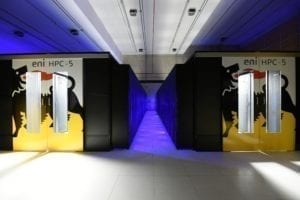Sophisticated supercomputing systems can process massive numbers of calculations related to bioinformatics, epidemiology, and molecular modeling, and are expected to help scientists develop answers to complex scientific questions about COVID-19 in hours or days versus weeks or months. Now, some of the world’s most powerful industrial supercomputers are being deployed in the fight against the spread of COVID-19, including those operated by BP plc (London; www.bp.com) in Houston and Eni S.p.A. (Milan, Italy; www.eni.com) in Ferrera Erbognone, Italy. Eni’s supercomputer, developed in collaboration with Dell Technologies, started up in February.

Eni’s supercomputing capabilities are being used to help with identifying promising drugs in the fight against COVID-19 (source: Eni)
BP is joining forces with the U.S. government, leading universities and the world’s largest technology companies by providing access to its supercomputer to help researchers halt the spread of COVID-19. BP will donate its significant supercomputing capability to the public-private consortium formed in March 2020 by the White House’s Office of Science and Technology Policy, the U.S. Department of Energy and IBM.
The group, known as the COVID-19 High Performance Computing Consortium, will pool resources and expertise from Amazon Web Services, Google Cloud, Microsoft, Hewlett Packard Enterprise, BP and others. They aim to provide COVID-19 researchers worldwide with access to the most powerful high-performance computing resources that can significantly advance the pace of scientific discovery in the fight to stop the virus.
BP will provide access to its Center for High-Performance Computing (CHPC) in Houston, which houses one of the world’s largest supercomputers for commercial research and processes enormous amounts of data for BP. It has 16.3 petaflops of computing capability, allowing it to process more than 16 million billion calculations per second and complete a problem in an hour that would take a laptop nine years. The Center’s staff includes experts in data science, applied mathematics, and systems architecture.
BP will also make available the expertise of its Biosciences Center, located in San Diego, California. The center consists of dozens of scientists who have capabilities in biological sciences, chemical engineering and chemistry, and works across BP to support many aspects of its operations. These scientists will work closely with BP’s high-performance computing team to understand research proposals as they come in and help prioritize work.
Researchers are invited to submit COVID-19 related research proposals to the Consortium via the online portal, which will be reviewed and matched with computing resources from one of the partner institutions. An expert panel of top scientists and computing researchers will work with proposers to quickly assess the public health benefit of the work and coordinate the allocation of the group’s powerful computing assets and resources.

Supercomputers are providing important simulation and analysis capacity to aid in important medical research related to the COVID-19 pandemic (Source: Eni)
Eni has contributed its supercomputing infrastructure and its molecular modelling skills available for COVID-19 research, offering its contribution with its tools and resources of excellence in the fight against this global emergency.
The collaboration is part of the European EXSCALATE4CoV project, led by the biopharmaceutical company Dompé, which brings together institutions and research centres in Italy and other European countries to identify the safest and most promising drugs in the fight against the Coronavirus. Eni contributes to the project in partnership with Cineca, a non-profit research consortium that involves the collaboration of universities, national research centres and the Italian Ministry of Education, University and Research.
The joint team will carry out dynamic molecular simulations of viral proteins relevant to the COVID-19 strain, to identify the most effective pharmaceutical components among the 10,000 present in the databases. Afterwards, an activity will be carried out for the research of new specific anti-viral molecules through the screening of billions of structures.
Eni has already started the activity with Cineca, and is providing the consortium with its technical skills and its HPC5 supercomputing system, the world’s most powerful supercomputer for industrial use. Its hybrid architecture makes the algorithms for molecular simulation particularly efficient.
“During a global emergency such as this, we must mobilize all available resources to overcome the challenges ahead. We are proud to contribute to finding solutions to this challenge facing humanity,” said Claudio Descalzi, Eni’s CEO.
“We thank Eni for its valuable contribution and we are confident that this collaboration will significantly contribute to achieve a result in the next future as well as providing a model for the recovery” said Sanzio Bassini, Director of Cineca’s supercomputing department.